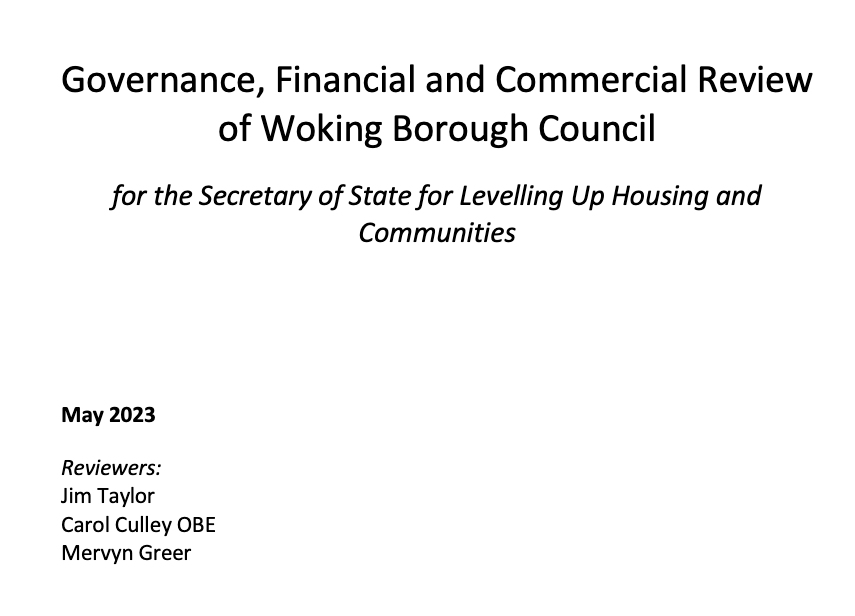 Abraham Lincoln
If given the truth, the people can be depended upon to meet any national crisis...
Abraham Lincoln
If given the truth, the people can be depended upon to meet any national crisis...
 Guildford news...
for Guildford people, brought to you by Guildford reporters - Guildford's own news service
Guildford news...
for Guildford people, brought to you by Guildford reporters - Guildford's own news service
Government Steps in to Manage Woking’s £2bn Debt – the Highest in the Country
Published on: 25 May, 2023
Updated on: 25 May, 2023
local democracy reporter
Woking Borough Council, proportionally, “the most indebted local authority” in the UK, has crumbled under the sheer weight of its crippling £2 billion debt as government-appointed commissioners have been sent in.
The borough council had amassed the huge debt as part of a failing investment strategy that has spiralled out of control leading to the situation it is in now – its annual interest repayments are more than it brings in from council tax.
Today, the Department of Levelling Up, Housing and Communites (DLHUC) has sent in three commissioners because of the “serious concerns that have been raised regarding the exceptional level of financial and commercial risk” the authority exposed itself to, “as well as its approach to strategic financial decision making and debt management”.
The council might also switch to full all-out elections every four years as that “can facilitate stable, strategic local leadership, delivering a clear programme for which it can be held to account by the electorate, and having the time to tackle some of the longer-term issues its communities might face”.
“The absence of such elections is often a consistent feature of under-performing councils and a common thread through many council interventions”, letters from DLUHC to the council read.
In a letter to the borough’s chief executive, DLUHC also criticised its “failure” to provide assurance “on the adequacy of the actions that it is taking to address the issues or provide assurance of its capacity to take the necessary action, considering the scale and pace of the response required.”
A government report titled “Woking Borough Council: External assurances review” published today (May 25) said: “In conclusion, as a result of past investment decisions, the council has failed its best value duty leaving an unprecedented legacy for the current Leadership Team, which they have not been able to address to prevent financial failure.
“It is evident that the council does not have the capacity and expertise to address the scale and complexity of these issues, and so it will continue to fail its best value duty.
“Resolving the issues and moving the council back to a place of financial stability and value-for-money for the taxpayer will require significant support, including statutory oversight.
“There is a need for commercial and financial support including capital, legal and forensic accounting specialists.
“The council will also need additional leadership capacity to help deliver this swiftly [content redacted for commercial sensitivity].
“There are critical decisions that need to be taken in the next 2-3 months, for which immediate expert support is required.”
Within six months, the council must now prepare and agree a credibly resourced “Improvement and Recovery Plan” to the satisfaction of appointed commissioners.
The plan should set out “measures to be undertaken, together with milestones and delivery targets against which to measure performance, in order to deliver rapid and sustainable improvements in governance, finance and commercial functions”.
DLUHC said it had been closely monitoring the concerns around Woking Borough Council’s commercial activity and financial situation.
Relative to its size, Woking is “the most indebted local authority” in the UK according to DLUHC.
DLUHC documents show that, as of December 2022, it had £1.9 billion in borrowing compared to a core spending power of £14 million.
It has two main companies, ThamesWey Group and Victoria Square Woking Ltd, that generated the majority of its debt – through associated housing and regeneration schemes
In January 2023, DLUHC commissioned an External Assurance Review, covering governance, finance and commercial issues, stating that it was “in the territory” of issuing a section 114 notice as part of setting its 2023/24 budget.
In a letter to Julie Fisher, chief executive of Woking Borough Council, Suzanne Clarke, deputy director at the Local Government Finance Stewardship, said: “After careful consideration of the evidence provided by the reviewers and officials, the Secretary of State considers that there is a pressing case for urgent government action to protect the interests of the residents and taxpayers of Woking, as well as national taxpayers.
“The financial challenge is acute, and the Secretary of State is concerned that key decisions need to be taken in the coming weeks and months to secure Woking’s financial position, as well as provide assurance that your authority is taking all steps necessary to comply with its best value duty.”
What Woking Borough Council said
Cllr Ann-Marie Barker (Lib Dem, Goldsworth Park), leader of Woking Borough Council, said: “I am committed to openness and transparency and will continue to keep residents up to date on progress as we deal with the council’s finances.
“I welcome the letter I have received today from the Minister and the recommendations being proposed by the team that undertook this review.
“I am pleased that there is acknowledgement of the strong collaboration between officers of the council and the review team on the progress that has been made to address the council’s financial resilience.
“My administration is very clear about the huge challenges facing the council due to the legacy of both the extraordinarily high and disproportionate levels of debt that we have inherited from the previous administration. We are also very clear and focussed on the significant risks that the council is now facing up to as a result of that debt.
“We also recognise that these challenges are so significant that the council and its officers cannot deal with these on its own. We therefore fully acknowledge and accept the findings of the report and welcome the support set out by the Minister in his letter.
“I know that councillors and officers will work at pace alongside the government-appointed commissioners to address the issues identified in the report and achieve best value for the public purse through the preparation and delivery of an action plan.
“When my administration gained control of the council last May, I pledged to take on the challenge of major change and embed affordable, responsible and sustainable principles into how the council conducts its future business and this remains my priority.
“As part of this pledge, we have taken steps to control borrowing, made changes to the governance of our commercial investments and I have instigated independent reviews of all the council’s borrowing and investments.
“I recognise we need to deliver our plans for recovery of the council’s finances with greater pace and urgency and we face difficult decisions in the months ahead. I will work with my officers to ensure, with the support of the commissioning team, we have the capacity and experience to deliver the improvements needed.
“I remain committed to keeping residents, businesses, and community partners fully informed as we progress through this process and develop the detailed plans for recovery with support and oversight from the commissioning team.”
Responses to Government Steps in to Manage Woking’s £2bn Debt – the Highest in the Country
Leave a Comment Cancel replyPlease see our comments policy. All comments are moderated and may take time to appear.
Recent Articles
- Guildford Institute’s Crowdfunding Project for Accessible Toilet in its New Community and Wellbeing Centre
- Letter: Guildford – Another Opportunity Missed?
- Letter: GBC’s Corporate Strategy – Where Is the Ambition?
- My Memories of John Mayall at a Ground-breaking Gig in Guildford Nearly Six Decades Ago
- Westborough HMO Plans ‘Losing the Heart of the Street’ Says Resident
- College Invests to Boost Surrey’s Economy and Close Digital Skills Gap
- Community Lottery Brings Big Wins for Local Charities
- GBC Housing Plan Promises ‘A Vibrant Urban Neighbourhood’ Near Town Centre
- Hospital Pillows ‘Shortage’ at the Royal Surrey
- Updated: Caravans Set Up Camp at Ash Manor School


Recent Comments
- Ian Macpherson on Updated: Main Guildford to Godalming Road Closed Until August 1
- Sara Tokunaga on GBC Housing Plan Promises ‘A Vibrant Urban Neighbourhood’ Near Town Centre
- Michael Courtnage on Daily Mail Online Reports Guildford Has Highest-paid Council Officer
- Alan Judge on GBC Housing Plan Promises ‘A Vibrant Urban Neighbourhood’ Near Town Centre
- John Perkins on GBC Housing Plan Promises ‘A Vibrant Urban Neighbourhood’ Near Town Centre
- S Collins on GBC Housing Plan Promises ‘A Vibrant Urban Neighbourhood’ Near Town Centre
Search in Site
Media Gallery
Dragon Interview: Local Artist Leaves Her Mark At One of England’s Most Historic Buildings
January 21, 2023 / No Comment / Read MoreDragon Interview: Lib Dem Planning Chair: ‘Current Policy Doesn’t Work for Local People’
January 19, 2023 / No Comment / Read MoreA3 Tunnel in Guildford ‘Necessary’ for New Homes, Says Guildford’s MP
January 10, 2023 / No Comment / Read More‘Madness’ for London Road Scheme to Go Ahead Against ‘Huge Opposition’, Says SCC Leader
January 6, 2023 / No Comment / Read MoreCouncillor’s Son Starts Campaign for More Consultation on North Street Plan
December 30, 2022 / No Comment / Read MoreCounty Council Climbs Down Over London Road Works – Further ‘Engagement’ Period Announced
December 14, 2022 / No Comment / Read MoreDragon Interview: GBC Reaction to the Government’s Expected Decision to Relax Housing Targets
December 7, 2022 / No Comment / Read MoreHow Can Our Town Centre Businesses Recover? Watch the Shop Front Debate
May 18, 2020 / No Comment / Read More












Ben Paton
May 25, 2023 at 6:40 pm
Perhaps the Dragon could follow up with a Who Dunnit article explaining how on earth Woking managed to borrow £2 billion!?
It all beggars belief.
And how are Guildford Borough Council’s shopping centre investments doing?
Keith Francis
May 26, 2023 at 8:55 am
Woking BC has been its residents own worst enemy with the ambitious building plans.
The “Pool in the Park” is the third incarnation built on the site of the original outdoor swimming pool after a failed attempt at another one which got swallowed up under the Town Centre development.
Woking was saddled with Sheerwater by the former London County Council but has only been interested in the private housing at the West Byfleet end and the commercial sites, so leaving the former social housing to rot, hence the massive changes that are, I believe, proposed.
They started developing the town centre when I lived at Woking until the late 1960s. It was initially paid for with Norwich Union Insurance Society money and some of the streets and walkways that radiated then are still there going towards Woking railway station.
It was OK for the council to build on green belt land at Westfield although anyone else was prevented from doing so. The former officer and elected councillors involved must wait to see what initiative the DLUHC might take against them and the unfortunate financial impact this will have on the town’s residents.